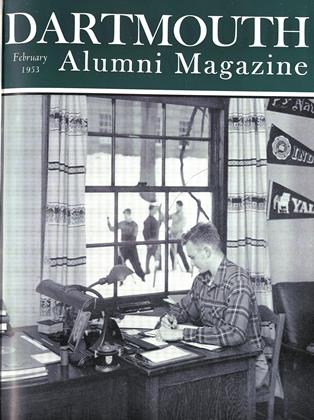Dartmouth's new Seminar on the Arctic, which this month makes its bow as a credit-carrying course in the curriculum, is a formal addition to the informal study, teaching and field work on the Northern Frontier that goes on as it has for several years in the past.
Important among the informal activities is the annual Cold Weather Program of the Dartmouth Outing Club, which organized it to meet the growing interest of students, faculty and alumni. The DOC's third such program opened in December and will continue through March with a series of lectures supplemented by field work. The lectures so far have dealt with cold weather clothing, forest camping, maps, travel in Labrador, and basic hunting. Talks during \February and March will deal with climate and weather, radio and communications, permafrost, air operations, geological problems of the Arctic, Katahdin winter project, and snowfield, icefield and glacier operations.
The DOC field trips are designed to provide experience with rations, snow houses, tents and stoves in an effort to eliminate some of the problems which inevitably arise when camping under severe weather conditions.
Eleven of the twelve lecturers in the 1952-53 program are drawn from Dartmouth's own faculty, indicating something of the extent to which members of the College teaching staff have specialized in various phases of the Northern Frontier.
 View Full Issue
View Full Issue
More From This Issue
-
 Article
ArticleThe First Five Years
February 1953 By JAMES P. POOLE '28h, -
 Article
ArticleTHE NEW FRONTIER
February 1953 By JOHN HURD '21 -
 Class Notes
Class Notes1918
February 1953 By ERNEST H. EARLEY, DONALD L. BARR -
 Class Notes
Class Notes1929
February 1953 By F. WILLIAM ANDRES, EDWIN C. CHINLUND -
 Class Notes
Class Notes1928
February 1953 By OSMUN SKINNER, JOHN PHILLIPS -
 Class Notes
Class Notes1908
February 1953 By GEORGE E. SQUIER, LAURENCE M. SYMMES, ARTHUR B. BARNES
Article
-
 Article
ArticleEarl Blaik Retires
MAY 1959 -
 Article
ArticleEverest Lecture To Raise Fund for Breitenbach Memorial
JANUARY 1964 -
 Article
ArticleStevens and Winship Elevated in Other Administration Changes
JUNE 1966 -
 Article
ArticleNomination of Trustee on Agenda of Council
DECEMBER 1966 -
 Article
ArticleCollege Party
APRIL 1994 -
 Article
ArticleGreen Jottings
June 1956 By CLIFF JORDAN '45

